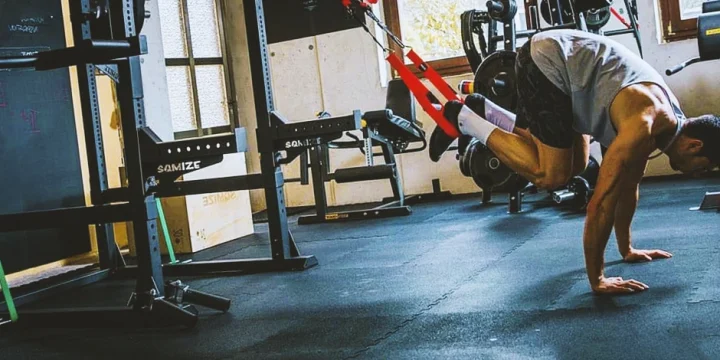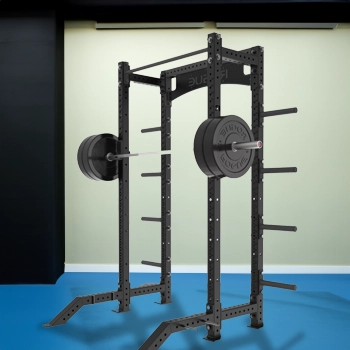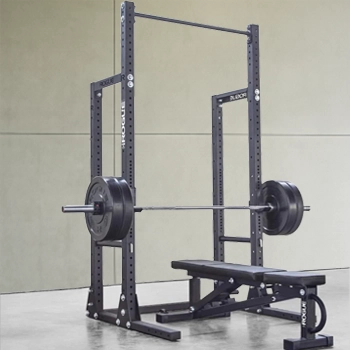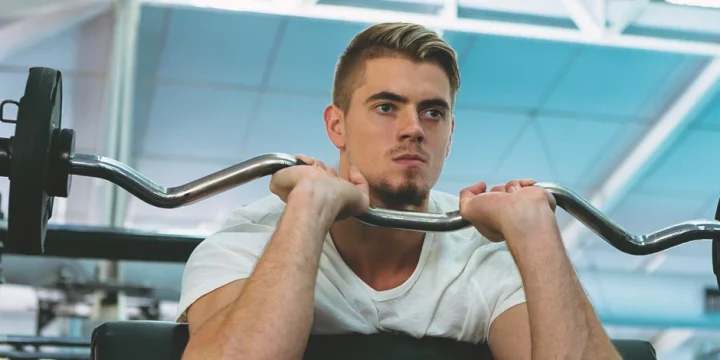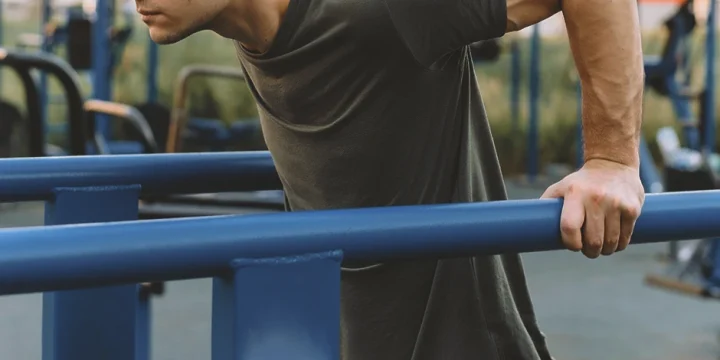If you're building a home gym with little space for equipment, as a fitness trainer, I can tell you that half racks (or power racks) are probably the best option.
A half rack can be an expensive investment, so you need to pick one that gives you your money’s worth.
To make things a little easier for you, we did extensive research here at TotalShape. After trying out many highly-rated half racks for three months, we narrowed down a list of the best ones.
Let’s delve into the best half racks for home gyms and what to consider before buying.
The Best Half Racks for Home Gyms
- Best Overall Half Rack for Home Gym: Monster Lite
- Cheapest Half Rack for Gym at Home: ZENOVA Power Rack
- Easiest to Assemble Home Gym Half Rack: Power Systems Granite Series
- Best Home Gym Half Rack for Beginners: Sunny Health & Fitness
- Best Durability Half Rack for Home Workout: Rogue HR-2 Half Rack
- Best Home Gym Half Rack With Weight Storage: GRIND Fitness Chaos 4000
- Best Compact Home Gym Half Rack: ZENOVA Power Rack
- Best Home Gym Half Rack With Conversion Kits: Signature Fitness Squad
Top 10 Half Racks For Home Gyms (June 2025)
1 - Monster Lite Half Rack (Best Overall)
- Dimensions: 53” x 55” (footprint), Height: 90.375”
- Maintenance : Easy
- Design : Compact, versatile
- Warranty : Yes (lifetime)
- Premium materials : Yes (11-gauge steel)
Pros and Cons
Pros
- Heavy-duty 3x3” 11-gauge steel spotter arms can withstand heavy drops
- Option for a dual pull-up bar
- Angled feet for added stability
- Comes with a lifetime guarantee
Cons
- Spotter arms, transport wheels, and floor mounts are sold separately
Who is it for?
Who is it for?
- Serious lifters seeking durability
- Home gyms with space constraints
Who is it not for?
- Those not looking to invest in additional accessories
Final Verdict
The Monster Lite Half Rack stands out for its durability and compact design, making it ideal for serious home gym enthusiasts. The lifetime guarantee adds immense value, ensuring long-term reliability.
Having used various racks in my fitness journey, the Monster Lite Half Rack from Rogue Fitness, designed and manufactured in the USA, truly stands out. Its unique hybrid design outperformed many other half racks I've personally tried in my home gym.
Besides being built to last, the rack features angled feet at the base that provide extra stability when you do pull-ups and dips or rerack heavy loads.
Monster Lite’s 3x3” 11-gauge steel spotter arms (an additional purchase) with UHMW lining. According to an article on the National Library of Medicine, this protects you from failed reps [1]. Plus, it also prevents damage to your barbell.
While it’s very stable, our elite lifters who squatted especially heavy one-rep maxes recommended bolting down the half rack for added stability.
With a lifetime guarantee, Monster Lite might be the last rack you’ll ever need for your home gym.
2 - Rogue HR-2 Half Rack (Best Durability)
- Dimensions: 49” x 48” (footprint), Height: 92.25” or 110.25”
- Maintenance : Easy
- Design : Convertible, compact
- Warranty : Yes (lifetime)
- Premium materials : Yes (11-gauge steel)
Pros and Cons
Pros
- Made with heavy-duty materials that can take heavy-weight drops with ease
- Modest footprint-to-stability ratio
- Additional 3x3” steel uprights offer excellent stability for heavy squats
Cons
- Doesn’t come with many accessories
Who is it for?
Who is it for?
- Beginners needing stability
- Those with limited space
Who is it not for?
- Lifters needing many accessories
Final Verdict
Rogue HR-2 offers exceptional stability with a modest footprint, perfect for those new to lifting in small home gyms. Though it lacks accessory options, its build quality makes it a durable choice.
When I first started my fitness journey many years ago, I was introduced to Rogue’s HR-2 half rack. Its classic design combined with stability and high-quality materials made it an excellent choice for a beginner like me.
The HR-2 half rack is widely rated for being space-efficient. It’s built with a 4ft x 4ft footprint, making it perfect for home gyms tight on space. It’s also built with additional 3x3” steel uprights that add additional support and has eight weight pegs for plate storage.
The 17” adjustable crossbar gives you ample foot-and-a-half space for comfortable rack pulls.
According to the more elite lifters in our group, the J-hooks weren’t the best. But beginners found them sturdy and reliable, owing to the fact that they didn’t lift as much.
Related Article: Best Rogue Power Racks for Home Gyms
3 - Power Systems Granite Series Half Squat Rack (Easiest to Assemble)
- Dimensions : 49”W x 48”D x 92”H
- Maintenance : Easy
- Design : Robust, space-efficient
- Warranty : Yes
- Premium materials : Yes (10 gauge steel)
Pros and Cons
Pros
- Matte black powder coat finish pull-up bar gives a good grip
- Very easy to assemble and take apart
- Westside hole spacing for precise barbell adjustments
Cons
- Doesn’t come with dip bars; they are too wide for comfortable dips
Who is it for?
Who is it for?
- Intermediate to elite lifters
- Those in small apartments
Who is it not for?
- Lifters who need dip bars
Final Verdict
This rack offers great stability and a straightforward design suitable for serious training in compact spaces. The lack of a dip bar might limit some exercises, but overall, it's a robust choice.
In my previous apartment, space was a constraint. That's when I stumbled upon Power System’s half squat rack, which turned out to be a perfect fit for my small home gym setup.
This squat rack is great for intermediate and elite lifters. Reinforced with butted steel plate welds and finished with a black powder coating, it’s made to withstand high-volume training sessions.
The uprights are constructed with 3x3” 10 gauge steel that can comfortably hold up to 1,000 lbs.
The safety arms, which come with this half squat rack, can withstand pretty heavyweight drops.
Given its stability, the only complaint some of our lifters had with this squat rack was that it didn’t have a dip bar.
4 - Sunny Health & Fitness Power Zone Half Rack (Best for Beginners)
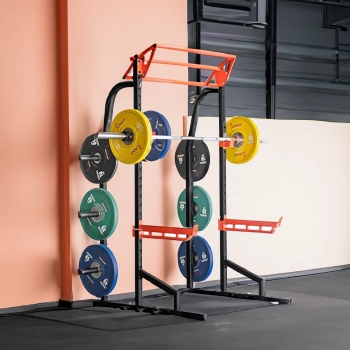
- Dimensions : 50.5 x 65 x 87 inches
- Maintenance : Easy
- Design : Compact, adjustable
- Warranty : Yes (1 year structural frame)
- Premium materials : Yes (Alloy Steel)
Pros and Cons
Pros
- Has the extra functionality of a lat pulldown and cable rows
- Excellent design and build quality for the price
- Has six spacious plate holders
Cons
- Made with alloy steel, so it might be as sturdy
Who is it for?
Who is it for?
- Beginners needing versatility
- Those interested in cable workouts
Who is it not for?
- Advanced lifters who need a heavy-duty rack
Final Verdict
This rack is versatile with options for cable workouts, making it great for beginners. However, its alloy steel construction may not hold up to the demands of heavier, more intense lifting.
During my quest for a versatile workout setup, I came across this power rack from Sunny Health & Fitness. Its features and adaptability made it an excellent choice for my diverse workout routines.
While you can’t bolt it to the ground, this half rack has six spacious plate holders, which you can load for added stability.
What makes this half rack unique are the additions. You can get an upgrade and add a lat pulldown and cable row extensions. So it’s got a little more versatility than the other half racks on this list.
While most half racks on the market are made with gauge steel, Sunny Health & Fitness makes theirs with alloy steel, which, according to a study published on Science Direct, makes it much lighter [2].
Some of our lifters mentioned they were a bit apprehensive about going super heavy on their squats with this particular rack.
5 - GDLF Power Rack
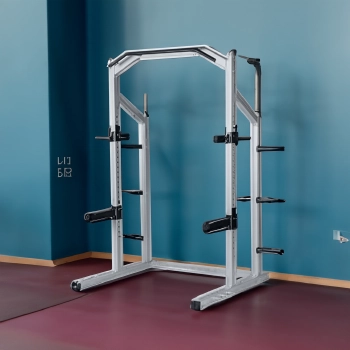
Pros and Cons
Pros
- Best option for beginner and intermediate powerlifters
- Very sturdy squat rack and a pull-up bar
- Spotter arms come with the rack
Cons
- Pull up bar doesn’t have the best grip
Who is it for?
Who is it for?
- Beginner and intermediate powerlifters
- Those preferring simple setups
Who is it not for?
- Those looking for advanced features
Final Verdict
GDLF Power Rack is ideal for straightforward strength training without unnecessary frills. It’s sturdy and reliable, though it might lack the grip quality on its pull-up bar.
As someone who appreciates simplicity in design, the GDLF power rack caught my eye. Its straightforward yet robust design was exactly what I needed for my powerlifting sessions.
This particular power rack doesn’t come with many fancy additions, so it’s perfect for those who simply rely on good old squats, overhead presses, deadlifts, and bench presses to develop whole-body strength [3].
The spotter arms come with the rack. They’re sturdy enough for heavy rack pulls or to catch your barbell after a bench or squat fail.
While some clients complained that the pull-up bar didn’t have the best grip, the rack was sturdy enough that it didn’t need to be bolted down when doing chin-ups.
6 - GRIND Fitness Chaos 4000 Power Rack (Best With Weights Storage)
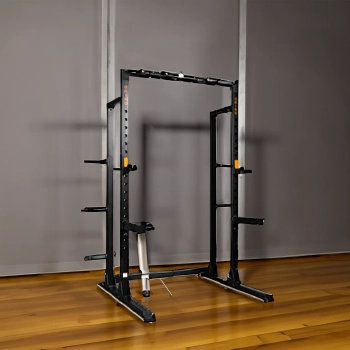
- Dimensions : 53"D x 51"W x 85"H
- Maintenance : Easy
- Design : Durable, multi-use
- Warranty : Yes
- Premium materials : Yes (Alloy Steel)
Pros and Cons
Pros
- Extra-wide base offers additional support
- Rated “commercial level” by intermediate and elite lifters
- Comes with a support bar and weight storage
Cons
- More challenging to assemble than other models
Who is it for?
Who is it for?
- Lifters needing weight storage
- Those who prefer robust builds
Who is it not for?
- Beginners who prefer easy assembly
Final Verdict
GRIND Fitness Chaos 4000 is a solid choice for those looking for a "commercial feel" at home with excellent weight storage. Its assembly might be challenging, but its durability makes up for it.
Having used Grind’s half rack in my own workouts, it truly brings the feel of a hardcore gym to your home with its grungy yet aesthetically pleasing design.
With six Olympic weight posts, easily maneuverable J-hooks, and heavy-duty and adjustable spotter arms, this half rack works well for powerlifters.
Besides its sturdy base, what makes Grind one of the best squat racks on this list is its numbered height positions.
This made it super convenient for clients to switch from back squats to front squats without the need to readjust bar tilts.
The only downside to this half rack is that it’s not always in stock. In fact, it took me a few months to get enough units for testing.
7 - Signature Fitness Squat Stand Half Rack Conversion (Best With Conversion Kits)
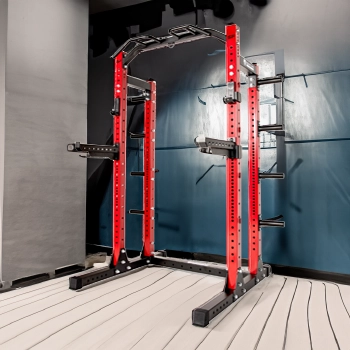
- Dimensions : 48.81"D x 49.21"W x 82.67"H
- Maintenance : Easy
- Design : Versatile, with conversion options
- Warranty : Yes (2 years)
- Premium materials : Yes (Alloy Steel)
Pros and Cons
Pros
- Comes with a conversion kit that turns the squat stand into a half rack
- Built and feels like commercial-quality squat racks
- Includes free UHMW-coated J-hooks and safety spotter arms
Cons
- Very susceptible to deep scratches
Who is it for?
Who is it for?
- Beginners without a spotter
- Those needing a conversion kit
Who is it not for?
- Those who dislike visible wear and tear
Final Verdict
Signature Fitness is perfect for beginners with its convertible design and included safety features. It's prone to scratches but offers great value with its sturdy build and additional accessories.
From my personal sessions, I found Signature’s squat stand to be one of the best choices for beginners doing squats without a spotter.
It comes with a conversion kit that turns it into a half rack.
One of the biggest perks of this squat stand is the Westside hole spacing for benching.
It’s no surprise that clients who were very particular about their bench went for this half rack. Plus, the free safety spotter arms really sweetened the deal.
While the Signature squat stand in itself can bear up to 1,000 lbs, lifters highly recommend going with the conversion kit for enhanced stability and safety.
“Westside hole spacing was originally created and recommended for athletes and powerlifters because they are the ones who genuinely need it.”
- Olivier Porier-Leroy, NASM-CPT
8 - Titan Fitness T-3 Series Half Rack

- Dimensions : Compatible with 72" and 92" heights
- Maintenance : Standard
- Design : Conversion kit for squat stands
- Warranty : No
- Premium materials : Yes (Alloy Steel)
Pros and Cons
Pros
- Best for low-ceiling gyms
- Westside hole spacing for a more comfortable lift
- Comes in three different heights
Cons
- No option for anchoring the squat stand to the floor
Who is it for?
Who is it for?
- Users with low ceilings
- Budget-conscious lifters
Who is it not for?
- Those who require a pull-up bar
Final Verdict
Titan T-3 Series is ideal for low-ceiling rooms and offers great value for money, catering well to novice and intermediate lifters. It lacks a pull-up bar, which might be a drawback for some.
Having trained on it myself, I can vouch for the Titan Fitness’ T3 series squat stands/half racks being suitable for beginners, intermediate-level trainers, and recreational lifters, all while being affordable and of high quality.
They come in three different heights, the shortest one being just 72”.
The Titan T3 was built for low-ceiling areas, so it doesn’t come with a pull-up bar. It’s made of 2X3″ 11-gauge steel frames that comfortably hold up to 1,000 lbs.
It also has a Westside hole spacing pattern in the benching area and 2′′ gaps for the rest of the upright.
A pair of J-hooks comes with the kit, but I had to buy a pair of spotter arms for benching exercises.
9 - HULKFIT Pro Series Power Squat Rack
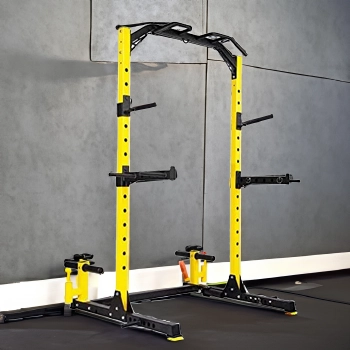
- Dimensions : 48.25"D x 49"W x 84.5"H
- Maintenance : Easy
- Design : Multifunctional with multiple accessories
- Warranty : Yes (2 years)
- Premium materials : Yes (Alloy Steel)
Pros and Cons
Pros
- Heavy-duty 12-gauge steel uprights with a medium gloss and powder-coated finish
- Super easy to assemble
- Comes with landmine and resistance bar attachments
Cons
- J-cups are of the highest quality and may wear after a few months of daily use
Who is it for?
Who is it for?
- Beginners and casual lifters
- Those needing additional workout attachments
Who is it not for?
- Heavy lifters who exceed 250 lbs
Final Verdict
HULKFIT Pro is a great entry-level option with features like a landmine and resistance bar. It's not suitable for very heavy lifting but is excellent for those starting out or lifting lighter weights.
Having tried the HULKFIT Pro in my early lifting days, I can attest that despite being the least expensive rack on this list, it's perfect for beginners and casual lifters.
But don’t let its low-cost fool you; it's an excellent product for lifters who are training with the basics.
Unlike the other racks on this list, the HULKFIT Pro comes with two barbell holders and a T-bar row, which adds another dimension to your workout routine.
The biggest downside of this half-rack was the J-cups. Daily use for a month led to much wear and tear. Some of our elite lifters even needed to replace them at a certain point.
Given its price, it’s still a good-quality rack for anyone who doesn’t plan on training with over 250 lbs.
10 - ZENOVA Power Rack Squat Rack (Cheapest and Most Compact)
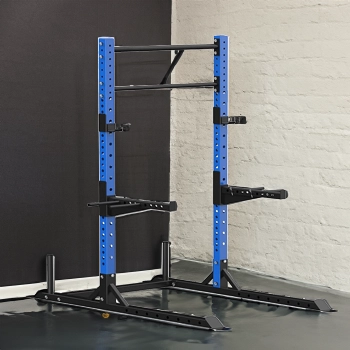
- Dimensions : 72"D x 50"W x 90.2"H
- Maintenance : Easy
- Design : Multi-functional, heavy-duty
- Warranty : Yes (2 years)
- Premium materials : Yes (Alloy Steel, 1200 lbs capacity)
Pros and Cons
Pros
- Comes with a pull-up bar and dip station
- Very easy to put together
- It fits perfectly in a small home gym
Cons
- Hole spacing is a little too far
Who is it for?
Who is it for?
- Those with very limited space
- Beginners starting with basic movements
Who is it not for?
- Powerlifters who need wider setups
Final Verdict
ZENOVA is the most budget-friendly and compact, perfect for small spaces and basic lifting routines. Its narrow build and hole spacing may not suit wide-stance powerlifters.
I especially liked this power rack when I combined calisthenics with the squat, deadlift, and bench.
In addition to a multi-grip pull-up bar, it had a dip station, making it the perfect squat rack for a calisthenics workout.
With a weight capacity of 800 pounds and a fairly narrow build, I wouldn’t recommend this squat stand for powerlifters who squat with a wide stance.
So, it’s a better option for starting out with basic powerlifting movements and calisthenics.
While many lifters found this budget power rack to do the job, others complained that the hole spacing was too far apart.
This limited their comfort on the squat and bench press.
How We Tested the Products
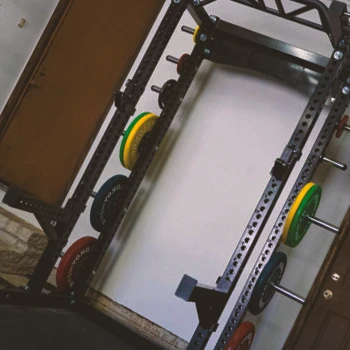
Here's how we chose the top power racks:
Durability
To gauge the durability of each half rack, we subjected them to rigorous daily use, simulating the wear and tear they would experience over years of regular workouts.
We also performed stress tests, including maxing out their weight capacities and observing any signs of strain or structural compromise. The quality of the materials, welds, and finishes were also closely inspected to ensure they could withstand the test of time.
Weight
Understanding the weight of a half rack is crucial, especially for those who might need to move or adjust their gym setup occasionally.
We weighed each rack using industrial scales to ensure accuracy. Additionally, we assessed the stability of each rack under various weight loads, from light to heavy, to determine if the rack's weight contributed to its overall stability and safety.
Price
While price alone doesn't determine the quality of a product, it's an essential factor for many consumers. We compared the price of each half rack with its features, build quality, and overall performance.
This allowed us to determine which racks offered the best value for money and which ones might be overpriced for what they delivered.
Buyer's Guide

While there's no one-size-fits-all half rack, certain factors like space, weight capacity, stability, material quality, versatility, and warranty are crucial. Let's delve into these considerations to help you make an informed choice.
Space
Space is one of the main reasons why many lifters prefer a half rack over a full rack for their home gyms. However, not all half racks are of the same dimensions.
So, you’ll need to do the following when planning the space for your half rack:
- Measure the dimensions of your home gym or the area you wish to use for the rack.
- Find a rack that suits those measurements but also accounts for a foot and a half extra on each side to accommodate the barbell and unsteady movement.
- If you plan on doing chin-ups, make sure there’s at least a half foot to a foot of space between the top of the rack and your ceiling.
Weight Limit
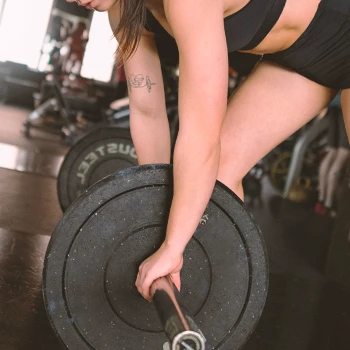
High weight capacity is a major factor most elite lifters will consider.
Even if you're starting out with light weights, choosing a squat rack with a strong weight capacity can be a long-term investment.
You won’t have to buy a new rack once you're lifting heavier weights.
Make sure you understand its weight limits and compare them to your current and projected weights.
Stability
Stability comes into play when you’re lifting super-heavy weights. It even matters when you do pull-ups or dips.
You want the safety and peace of mind that your rack won't move around when performing exercises.
However, it’s not essential, and it's possible to lift heavy loads with a less stable rack.
Your rack’s stability depends on the following factors:
- The rack’s footprint (the surface area it covers on the floor and its base of support).
- Design of the rack’s base.
- The weight of the entire rack.
Always make sure to test out a rack’s stability before purchasing.
Our rule of thumb here is to test the rack with a few pull-ups.
You can also do a dead hang and move around in that position to determine how stable the rack is. If it shakes too much, you might need to bolt it down.
Quality of Material
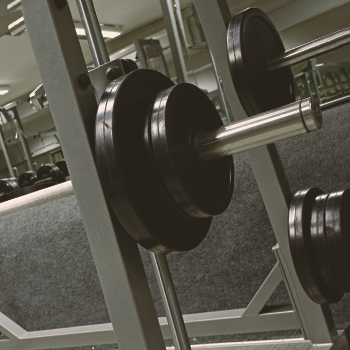
The quality of your rack will determine its longevity. Almost all of the best squat racks on the market are made with powder-coated steel.
High-quality steel gauges are one of the most important indicators of a half rack’s durability. Racks with 3x3” 11-gauge steel seemed to be the most durable in our experience.
The only downside is that these are heavier, so only consider buying them if you don’t plan on moving the rack around.
In addition to the attachments and main parts, the quality of your fastening items (like screws, nuts, and bolts) is also important.
If these are of poor quality, then your entire rack is susceptible to damage or falling apart.
“The heavier your rack is the better as well, at least when it comes to stability. Look for a 3 x 3 rack with 11 gauge steel.”
- Ryan Horton, Sports Scientist
Versatility

The versatility of your squat rack refers to how much more you can do with it than just the basics.
Based on our survey, the two most important aspects of versatility for our lifters had to do with weight storage and hole spacing.
Weight Pegs
Weight pegs for plate storage have two major advantages.
Firstly, they allow you to store your plates on the half rack, so you don’t have to purchase a separate contraption for weight storage.
This saves you both money and room.
Secondly, they add to the overall stability of the half rack. Clients reported that a fully loaded squat stand felt more stable when the weight storage pegs had several plates on them. While this means you may have to buy extra plates, it certainly beats bolting down your half rack.
So, if you plan on doing super-heavy squats with a slightly unstable rack, you should consider investing in plates and making full use of your rack’s weight storage.
Hole Spacing
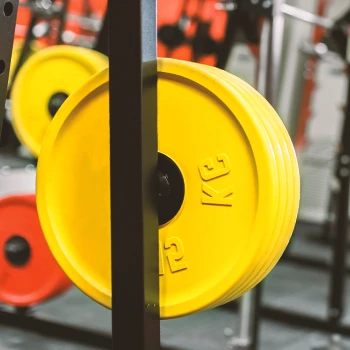
Hole spacing plays an essential role, especially for more elite lifters, in providing comfort while lifting heavy weights.
Let’s say you’re about to unrack your one-rep max for a squat. But the hole that’s just below being too high has you performing a mini squat. It’s a waste of your efforts.
While the standard hole spacing of 2 inches (50 mm) should be fine for most lifters, many prefer racks with the Westside hole spacing, which is 1 inch (25 mm).
This allows lifters to get a more detailed and comfortable unracking position, which adds to their performance.
Since they require more work, squat racks with westside spacing tend to be more expensive than standard ones.
Attachments

Half racks that come with additional attachments increase their versatility, giving you more bang for your buck.
Here’s what attachments to look for.
Spotter Arms
Spotter arms or safety bars are a must if you plan on training alone. Accidents are bound to happen with any weight, but they’re obviously more dangerous with heavier weights.
More often than not, spotter arms are additional purchases, but they’re a heavy investment in your safety.
One of the signs of low-quality squat stands is a space between the uprights and spotter arms. This poor design, found in many squat stands, can lead to serious injury.
“Spotter arms, safety pins, and safety straps are three options to make it easier to safely bail out of a failed squat.”
- Kate Meier, NASM-CPT, USAW-L1, CF-L1
Dip Bar
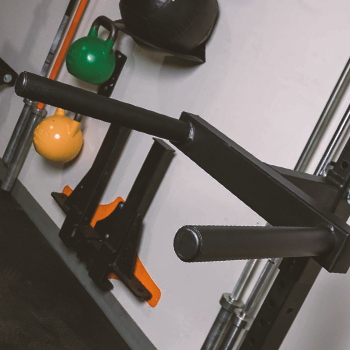
Power racks tend to be wide, so only a few of them will have quality dip bars.
The narrower ones, more often than not, come with a fixed dip bar or additional attachment.
If calisthenics are an important part of your home workout, we recommend getting a power rack with detachable bars so they don’t get in the way of your other workouts.
Pull-Up Bar
The pull-up is one of the best upper body exercises for which there’s no substitute [5].
The best half racks will have strong pull-up bars with a good grip.
While a standard straight pull-up bar is sufficient, you might want to invest in a rack with a multi-grip bar for a more advanced workout [6].
Customization
One of the primary considerations when investing in a half rack for your home gym should be its customization options.
As you evaluate different models, look for those that allow you to modify components like the pull-up bar, J-cup designs, or even include additional attachments like dip bars and band pegs.
The ability to tailor your half rack ensures that it aligns with your specific workout regimen, offering you the best value for your investment.
Safety Features
Here are the essential safety features to consider:
- Safety catches or pins: These are horizontal bars that run inside the half rack. In the event you can't complete a rep, you can safely drop the weight onto these catches. They should be easily adjustable to accommodate different exercises and heights.
- Locking mechanisms: If the half rack has adjustable components, such as J-cups or safety bars, ensure they have secure locking mechanisms. This prevents them from accidentally shifting or coming loose during a workout.
- High-quality welds: The welds on the half rack should be smooth and consistent. Poor welding can be a weak point in the structure and might compromise safety under heavy loads.
- Pull-up bar grips: If the half rack comes with a pull-up bar, ensure it has non-slip grips. This prevents your hands from slipping mid-exercise, which could lead to falls or injuries.
- Rack depth: A deeper rack allows for a more extensive range of motion, especially for exercises like squats. It also provides an added layer of safety, ensuring you remain within the confines of the rack during your lifts.
- Barbell storage: Some half racks come with integrated barbell storage at the back. Ensure these are positioned in a way that the barbell doesn't pose a tripping hazard or interfere with your workout.
Warranty

You want to go for racks that have at least a one-year warranty.
In our experience, it takes about 2–3 months to get a strong idea of how your rack will perform in the long run.
Sometimes, a rack will do well for the first couple of months. However, with more usage, you might find issues with the safety bars, stability, j-hooks, and other parts.
Your best option would be to choose a bar with a lifetime warranty.
Half Rack vs. Full Rack
When deciding between a half rack and a full rack, it's essential to weigh the pros and cons of each based on your specific needs.
Half racks, with their open design, offer more maneuverability and are often ideal for spaces with height restrictions. They're also typically more affordable and easier to move.
On the other hand, full racks provide an enclosed space, which can offer enhanced safety features, especially for heavy lifting. However, they might occupy more space and could be overkill for beginners or those with limited room.
When choosing, consider your workout goals, available space, budget, and safety preferences to determine which rack aligns best with your requirements.
FAQs
Is a Half Rack Worth It?
Yes, a half rack is worth it. Compared to a full rack, it’s inexpensive, easier, and faster to install and take apart, and it allows you to perform squats, pull-ups, dips, and many other exercises without taking up too much space.
Do I Need a Half Rack or Full Power Rack?
You will need a half rack if you’re building a home gym or if you’re tight on space. However, if you plan to lift really heavy weights without a spotter, then a full power rack is the best option (provided you have the space for it).
Do You Have to Bolt Down a Half Rack?
No, you don’t have to bolt down a half rack. Most high-quality racks come with anti-flip joints that allow you to place heavy weights on them. However, if you want to ensure extra security and don’t plan on moving around your half rack, you may bolt it down.
How Stable Are Half Racks?
Half racks are stable enough to let you squat heavy weights. However, they are much safer when bolted to the ground. This is a more convenient option if you plan on doing heavy pull-ups, muscle-ups, and dips because it might keep the half rack from shaking too much.
What Rack Depth Is Best?
A rack depth that allows you to squat comfortably with your arms slightly beyond shoulder width is best. This will depend on your flexibility and the kind of squats you perform.
Why Is It Called a Half Rack?
It’s called a half rack because it’s a smaller version of a full rack—nearly half the size. It’s lighter, smaller, and more convenient than a full rack. The full rack has four bars, forming a cage. With the half rack, you have only two bars for support.
How Much Space Do You Need for a Half Rack?
You’ll need at least 8ft x 8ft worth of space for a half rack. This can accommodate a standard 7 ft bar and 4 ft bench and give you ample space to lift. You might also need another foot of clearance above the rack to perform pull-ups comfortably.
Our Verdict on the Best Half Rack
Having personally tried and tested various half racks, the Monster Lite stands out as my top pick. Its durability and compact design make it ideal for home gyms, especially those with space constraints.
I remember the confidence I felt, even with heavy lifts, knowing that this rack wouldn't let me down. Plus, the lifetime guarantee is a testament to its quality.
If you're looking for a reliable half rack, the Monster Lite is worth every penny.
Our #1 Recommendation
Monster Lite Half Rack (Best Overall)
Rated With Total Shape's Scoring System
- Heavy-duty 3x3” 11-gauge steel spotter arms can withstand heavy drops
- Option for a dual pull-up bar
- Angled feet for added stability
- Comes with a lifetime guarantee
- Get the BEST PRICE until the end of June
- Spotter arms, transport wheels, and floor mounts are sold separately
About The Author
You May Also Like
